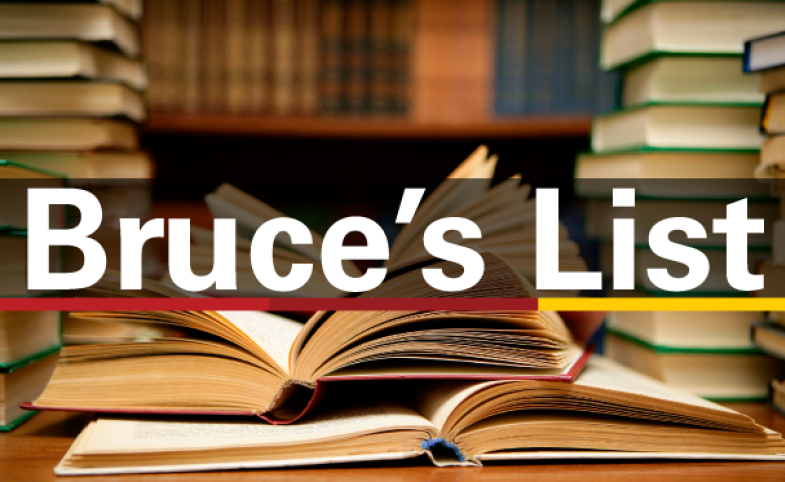The April edition of Bruce Gregory's public diplomacy reading list is now available. Known affectionately at CPD as "Bruce's List," this list is a compilation of books, journal articles, papers and blogs on a wide variety of...
KEEP READING
Public Diplomacy Must-Reads for Spring
The March edition of Bruce Gregory's public diplomacy reading list is now available. Known affectionately at CPD as "Bruce's List," this list is a compilation of books, journal articles, papers and blogs on a wide variety of PD topics, featuring a number of CPD scholars. Highlights from this edition include:
Sanford J. Ungar, “The Study-Abroad Solution: How to Open the American Mind,” Foreign Affairs, March/April 2016. Ungar (President Emeritus, Goucher College) takes issue with “the almost universal failure of the broader U.S. public to know and understand others, except through the military lens.” His approach to this dangerous problem is to “massively increase the number of U.S. college and university students who go abroad for some part of their education and bring home essential knowledge and new perspectives.” His article discusses challenges to expanding learning abroad and provides evidence of its educational, economic, and public policy benefits.
Mark Seip, “Harnessing Communications and Public Diplomacy: Four Rules for Success in Strategy Development,” Atlantic Council, Issue Brief, January 2016. Seip (Atlantic Council Nonresident Military Fellow) argues the US “appears out of touch” in the “use of information and public diplomacy” and is losing ground to ISIS, Russia, and China. He calls for national policymakers to emphasize four “core communication elements” in developing strategies and policies: (1) understanding how today’s audiences use technologies and receive information, (2) find mutuality and common ground, (3) create space for conversations that are sustainable over the long term (a goal undercut by the risk aversion of lawmakers and Washington officials), and (4) engage in conversations, not monologue.
David Greenberg, Republic of Spin: An Inside History of the American Presidency, (W. W. Norton & Company, 2016). Greenberg (Rutgers University) has authored a readable and well-researched account of the ideas and personalities that shaped presidential level efforts to influence public opinion at home and abroad, from Teddy Roosevelt to Barack Obama. Although much of his focus is on domestic politics, Greenberg has a lot to say about the evolution of U.S. diplomacy’s public dimension. Specialists will find new insights on George Creel, Walter Lippmann, Woodrow Wilson, Harold Lasswell, Edward Bernays, Archibald MacLeish, George Gallup, Robert Sherwood, Elmer Davis, William Benton, C. D. Jackson, Ted Sorenson, Michael Deaver, and Karen Hughes. Greenberg’s themes include the impact of new technologies, debates on rational arguments and emotional appeals, contrasting views on leadership and public opinion, media strategies, organizational issues in White House and executive branch agency approaches to managing “psychological warfare” and “information,” and multiple conceptual issues (e.g., deeds vs. words, attribution of information, messaging, news management, framing terms, selective perceptions, and image making).
Antoaneta M. Vanc and Kathy R. Fitzpatrick, “Scope and Status of Public Diplomacy Research by Public Relations Scholars, 1990–2014,” Public Relations Review, January 2016. Vanc (Quinnipiac University) and Fitzpatrick (American University) assess a significant increase in public diplomacy research by public relations scholars during the past quarter century. Their article looks at leading public relations scholars working on public diplomacy, their research topics and methodological approaches, and their contributions to theory building and diplomatic practice. Findings include the promise of a relational approach to public diplomacy research, the need for empirical studies, and development of comparative studies to identify public diplomacy best practices.
Alberto M. Fernandez, “Countering the Islamic State’s Message,” The Journal of International Security Affairs, Number 30, Winter, 2016. The former State Department Coordinator for Strategic Counterterrorism Communication argues the Islamic State’s rise is the product of the historical circumstances—“events on the ground and the changing political-reality in the region.” He argues the response to ISIS has been especially deficient in countering its ideology, and offers a two-fold approach: (1) Deep comprehension of the main elements of the “ISIS package”—its Salafist worldview, its “grievance collecting,” and its utopianism, and (2) Building a counter-narrative grounded in increasing the number of “anti-ISIS messengers,” content appropriate to a utopian, grievance-laden version of jihadist Salafism, amplifying disaffected voices, citizen empowerment, and personal outreach.
The complete list is available here.
Visit CPD's Online Library
Explore CPD's vast online database featuring the latest books, articles, speeches and information on international organizations dedicated to public diplomacy.
Popular Blogs
-
January 29
-
January 20
-
January 28
-
January 2
-
January 8










